QuestionI have a grey and white Syrian called Button who is roughly 8months old and I have noticed recently that he has been losing weight. Although I am aware there is a possibility this could be his winter fat that he is losing, it is worrying me quite a lot as he is only my second hamster and my last hamster Smudge only lost weight like this after he developed cancer but he was around 2.5 years old.
Button has been acting normally, pouching and storing all his food and drinking a lot. The only odd thing is that he does his toilet where his food store is kept so I have to keep cleaning that out and replacing the food. I have seen him eat, but there's no way for me to tell how much he's actually eating as he's rarely awake when we are except to drink and collect his food for storing.
I recently starting to keep a small record of how much weight he's been losing. I would have continued with it over a longer period of time, but after weighing him tonight and realising how much he'd lost, I think it's time to seek an opinion as to whether I should get him to a Vet:
22nd February - 134g
25th February - 132g
26th February - 133g
9th March (tonight) - 125g
I'm just not sure how much a Syrian should weigh, but even though he seems bright and active, he feels so thin and delicate. I can't get to a vet until next week, but I still need to know how serious this could be and if there's anything I can do to help him. I have been giving him extra food, locust beans and even a tiny steamed (cold) baby carrot the other night. Is there anything else I can do? What could be wrong with him?
Thank you so much for your time in helping with this. I look forward to recieving your reply.
AnswerHi Kayleigh
Sorry I misread your initial question and didn't take on board that he is only 8 months old. Weight loss isn't particularly normal at this age.
Some hamsters have very prominant scent glands and these are normal. Sometimes you can see a black spot on them and they can go bald there. Some hamsters lick them a lot.
Regarding diabetes - the signs for this are excessive water drinking to the point that you notice it. Also, the hamster pees a lot, and this smells very sweet. If you think it could be this, you can test quite easily. You need to get a 'diastix' either from the vet or from a chemist. You put the hamster in a clean plastic container and sit and wait for them to pee - then test it. If the glucose level appears high, then it is likely to be diabetes. It is almost impossible to check definitely as the only way would be to take a blood sampled, which with hamsters is unlikely due to their tiny size and lack of blood for the test.
In situations where diabetes is possible it is best to take immediate steps to prevent the hamster having problems balancing sugar. This is done by removing all sugary food from their diet - this includes dry fruits that often come in hamster mixes and treats (as a lot contain honey)and any fresh fruit. In addition to a standard dry mix, and fresh vegetables daily, it is important to make up a mix of sunflower, sesame, pumpkin and linseeds. These contain essential fatty acids and help the hamster regulate their sugar levels. A teaspoonful of this should be given daily.
I have had many hamsters with diabetes (mostly dwarf) and the majority have been able to to regulate their sugar levels but action needs to be taken immediately.
I would strongly advise that after checking there is no obvious dental problem, that you treat for diabetes until you can ascertain if this is the case. It will not do any harm eliminating sugar, and if he does have diabetes then this will hopefully help him.
I hope you get on OK.
regards
Sheila
Hi Kayleigh
Hamsters can lose weight as they get old. It could just be old age, or there could be some underlying problem - it is difficult to know.
However, the first thing I would suggest is that you have a good look at his teeth. They can break their teeth or lose them and if one of the front teeth overgrows this will stop them eating properly. Their front top teeth should be relatively short in comparison with the bottom teeth - if you are not sure, I'm sure there is a picture online that will show you what is normal. If one of the bottom teeth is considerably longer than the other, then it will need trimming. This needs to be done carefully with clippers (nail plier type) and you must be careful not to catch the teeth/cheek when you cut.
I always keep a packet of baby food - the creamy porridge oats variety is very popular with hamsters - and mix a little with water. This contains lots of nutrients and is easy for an elderly hamster to eat. It also tends to help them gain weight. It would be worth trying him with something like this, or other baby food, or scrambled egg etc. in addition to his usual dry hamster mix. Try and vary it to keep his interest. Also, keep a close watch on his teeth so that they don't overgrow if you are feeding softer food.
In terms of him pooing in his nest/food - this is quite common, so I wouldn't worry about this. The only time you really need to worry is if there are signs of diarrhoea/constipation.
Is he drinking more than usual? I have a very elderly hamster right now and he looks incredibly skinny, but this he is just a little old man! Providing your hamster has quality of life, is still eating, is taking an interest in things then it is probably OK just to let him get on with it. However, if there are signs of lethargy, excessive water drinking, sitting hunched, any discharge/blood coming from his rear, difficulty walking etc. then definitely get him checked out. Also, if you are worried, then for your own peace of mind you might want to get him looked at, but judging by his age, his weight loss could just be as a result of this. However, hamsters are prone to getting tumors, but these usually result in an excessive amount of water being drunk and the hamster tends to lose body weight around their top half, but they gain size in their bottom half. When they become serious, the hamster often struggles to walk, is lethargic, sometimes in serious cases there is blood/pus coming from their rear - all these are symptoms that need veterinary attention.
I hope this helps you.
Regards
Sheila

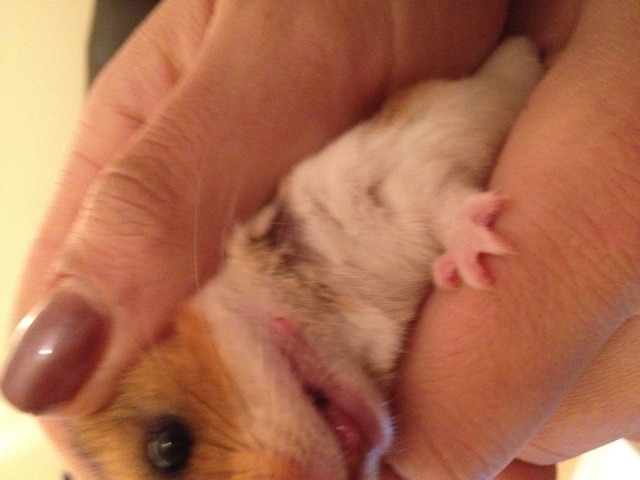 Syrian Hamster - Growth on corner of mouth
Question
Hamster - Growth on Mo
Hi,
My four mon
Syrian Hamster - Growth on corner of mouth
Question
Hamster - Growth on Mo
Hi,
My four mon
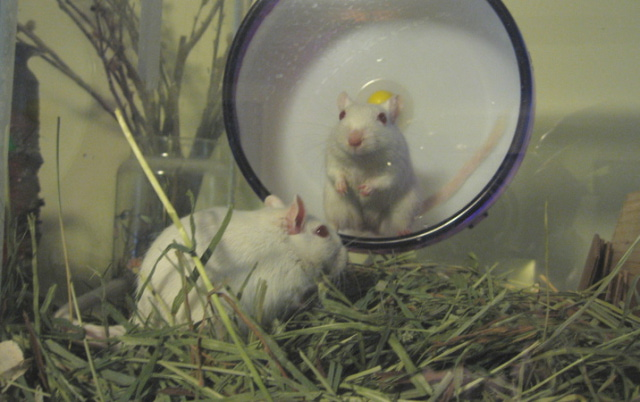 Companion for gerbil left?
Question
My girls
Hi Sheila! We purchased
Companion for gerbil left?
Question
My girls
Hi Sheila! We purchased
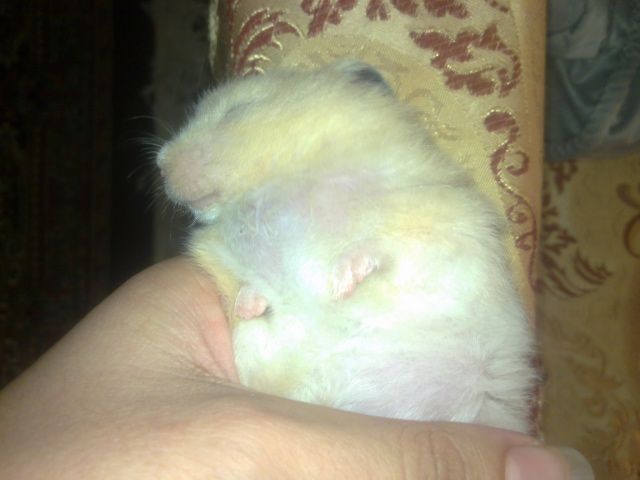 Lump under hamsters throat
Question
Lump under hamsters th
recently, I noti
Lump under hamsters throat
Question
Lump under hamsters th
recently, I noti
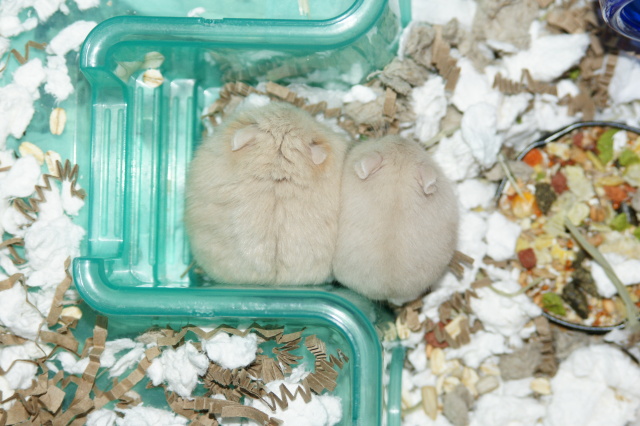 Follow up baby ham
Question
Candy and Peanut
Hi Sheila...there seems to be
Follow up baby ham
Question
Candy and Peanut
Hi Sheila...there seems to be
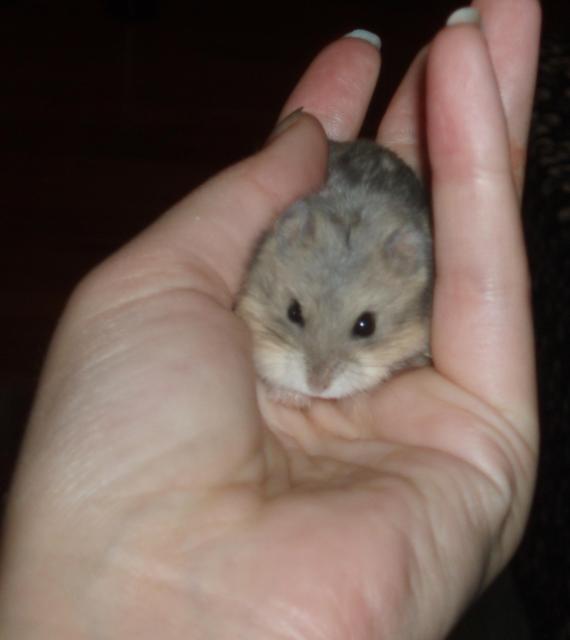 Biting getting worse
Question
Ponyo
Jedediah-
About six months ago one of m
Biting getting worse
Question
Ponyo
Jedediah-
About six months ago one of m